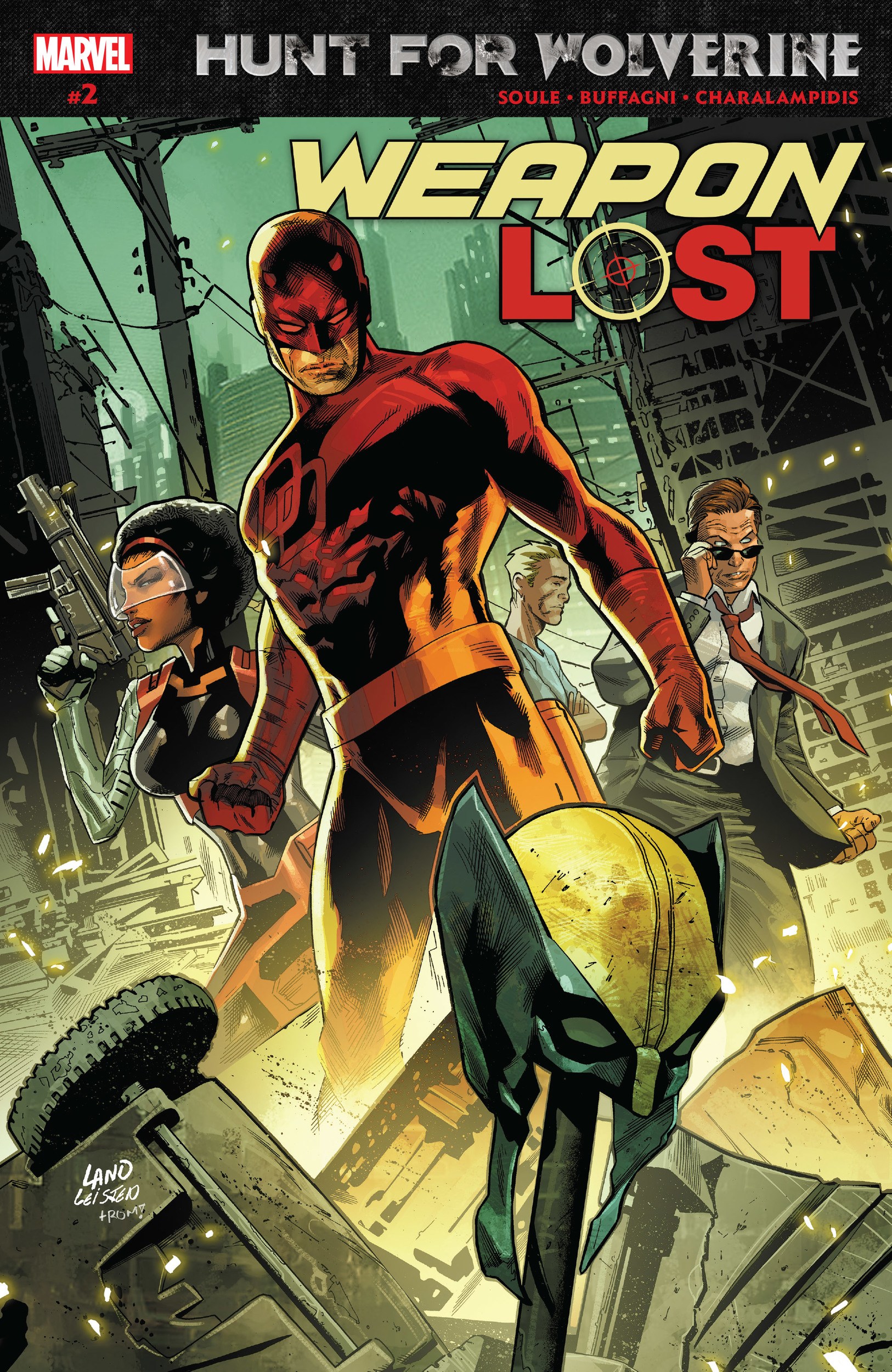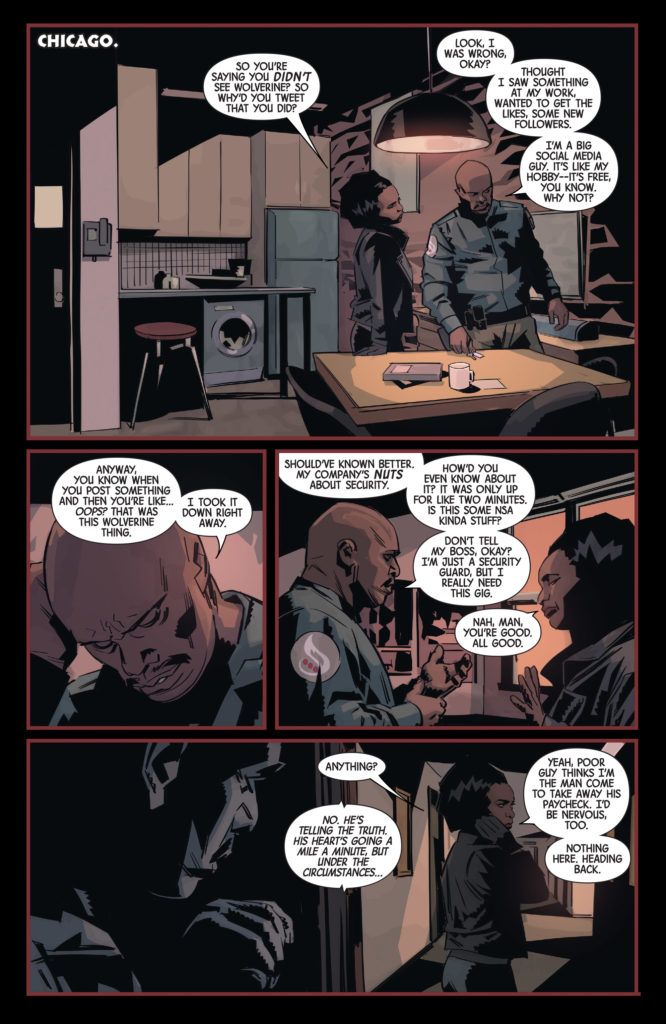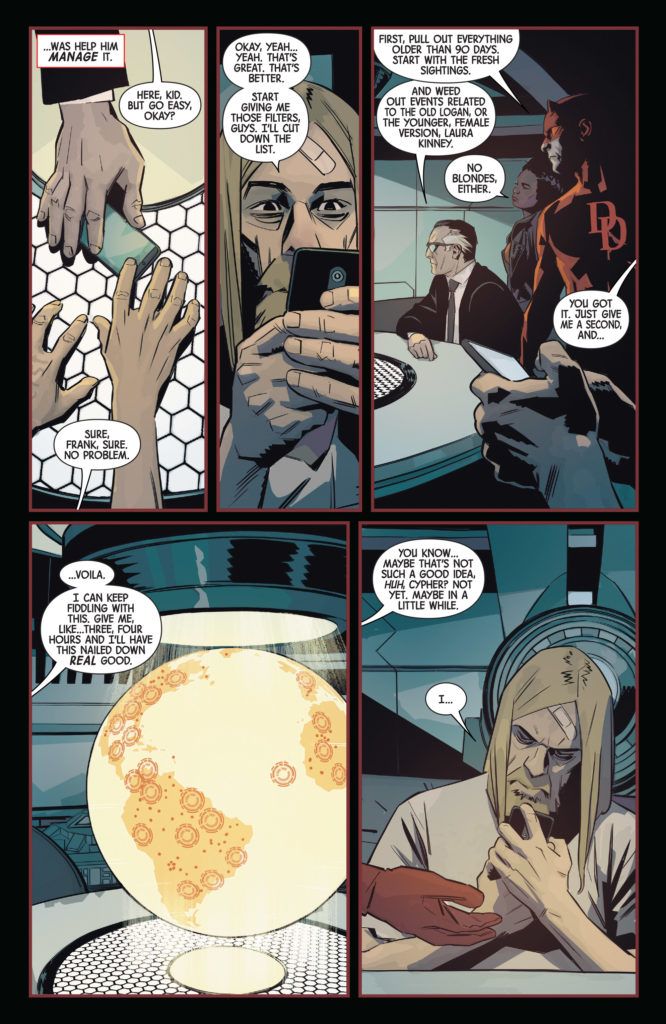Writer: Charles Soule / Artist: Matteo Buffagni / Marvel Comics
“When the leads dry up on a case, they call it cold.” – Daredevil
Issue #2 of “Weapon Lost” in the Hunt for Wolverine multi-mini-series storyline finds Daredevil and his investigative team of Misty Knight, Inhuman Frank McGhee, and Cypher the junkie ready to locate Logan. By using Cypher’s mutant ability to translate all languages (including coding), they are faced with an impossible amount of reported “Wolverine sightings.” Overwhelmed, but wary of Cypher’s dangerous internet addiction, the team allows him brief access to a smartphone in order to filter the results to exclude “old Wolverines, female Wolverines or blonde Wolverines”.” From there, the team splits up for some old school detective work, following leads from Chicago to Phoenix, Manhattan to Saskatchewan. Ah, the conveniences of an Attilan Skycharger.
Still, as determined and skilled as they be, the mystery lurking at the heart of their hunt for Wolverine may actually turn their weakest member into the prey.
False Idols
The cult of celebrity does strange things to both the adored and adorer. In the Marvel Comics universe, this phenomena permeates one thousand-fold as mutants, Avengers, vigilantes, and cosmic beings are part of the daily consciousness. Misty Knight and Frank McGhee learn this firsthand as they pursue Wolverine sightings across the country. When following a lead in Phoenix, McGhee hurts the feelings of a dive bar jockey whose claim to fame is that he fought and killed Wolverine. His proof? FOUR claw marks across his torso. Riiight. Misty does not fare much better. When she interrogates a security guard who admits to lying about seeing Wolverine in order to gain more like and follows on social media, the comic reveals some interesting subtext.
In a society constantly connected through technology, alienation runs deep. Approval, status, and attention are social proof beyond the material. In a world of super gods, mutants, and Avengers, sychophantic behavior runs deep, and for the normal people just being vaguely associated with Wolverine is an opportunity to capitalize on his legend. The same people spotting Wolverine probably saw 2pac and Elvis at Waffle House the week before.
We Need to Talk, Cypher . . .
Mutant powers are alienating enough. One of the key tenants of the X-family is the idea of family and unity. Whether lead by the philosophy of coexistence or supremacy, Professor X or Magneto, unity persists. Cypher, however, represents one of those mutants who falls outside of the war. Once an X-Man, but now an outcast, Cypher’s mutant ability causes not only isolation, but extreme addiction as a result of the hyper-access to information that is the internet. When Daredevil, Knight, and McGhee recruited Cypher in the first issue, he was near death – connected to countless monitors, malnourished, and barely conscious. His ability to rapidly decipher and filter information, however, is the only chance the team has to pinpoint Logan’s locale.
The characterization of Cypher is one of the key elements that makes this series such an interesting read. He is the “Pookie: to Daredevil’s Ice T in “New Jack City” terms. His vulnerability and illness allegorize a real-world issue that bring a deeper emotional and social context to this series. True to its crime and noir-leaning tone, Cypher is the junkie informant who the team cannot fully trust, but they need his skills.
The Hunt Continues
Two issues in, the series provides a solid read. Buffagni’s art continues to evoke a sleek Soule’s script uses classic noir narrative conceits in a way that allows these characters to shine to the best of their personalities. Daredevil’s paranoid and vigilant narration, the chemistry between former cops Knight and McGhee, and Cypher’s dubious stability collide to invoke a book that would have fit nicely in the Marvel Knights line of old.
Want to get Black Nerd Problems updates sent directly to you? Sign up here!
Follow us on Twitter, Facebook,Instagram, Tumblr, YouTube and Google+.





Show Comments